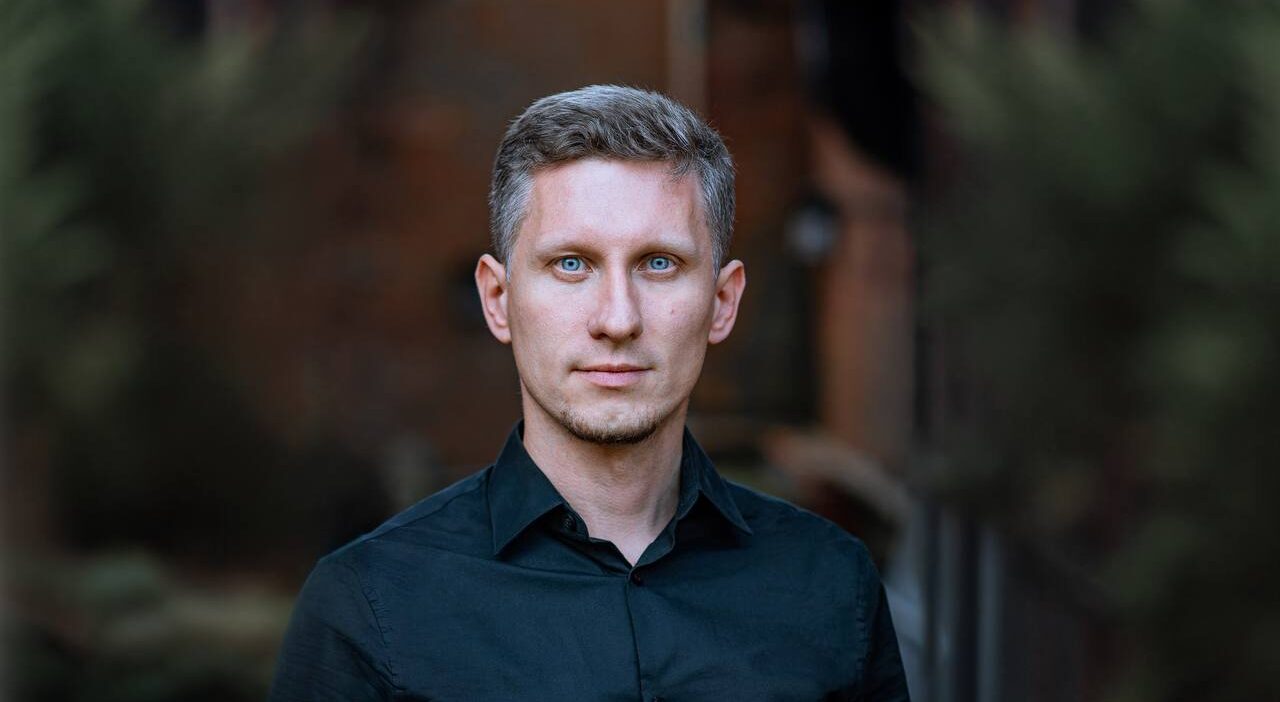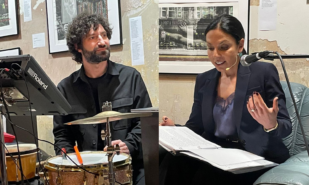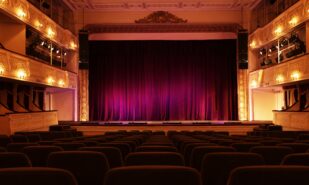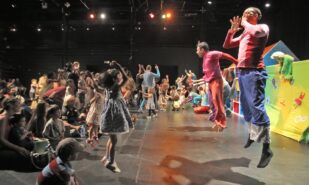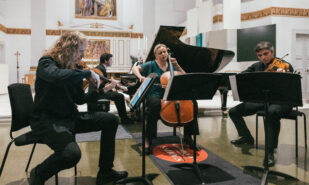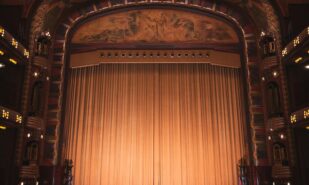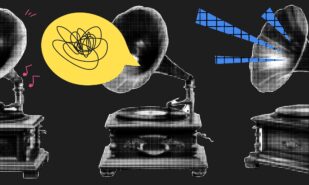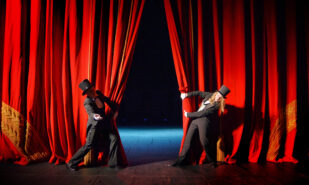Nikita Sukhikh: “After 50 performances of ‘Swan Lake’ I still crave to direct more of this music”
London Cult has made a trip to Guildford to speak to conductor, composer and violinist Nikita Sukhikh ahead of a performance of “The Nutcracker”, which before that, along with “Swan Lake” was presented to British audiences in many cities over several months. Nikita Sukhikh conducted the orchestra in this project, travelling through British cities and delighting children and adults alike with the opportunity to see “The Nutcracker” and “Swan Lake”.
Nikita, you are a violinist and conductor by training. Please tell us about your conducting work in England in the ballet tour you took part in this autumn. Today I will be seeing your production for this project, “The Nutcracker”, and you have also presented “Swan Lake” to British audiences in various cities. Tell us a little bit about the project. How did you get invited to be part of it? What do you expect from your participation in it?
How did I get to be part of this project? The project is called ‘International Imperial Ballet’. I got into it a year ago. A man who works for this company asked me to replace the conductor in an emergency. The conductor couldn’t come to the first performance for objective reasons. And literally in one day, or rather, in one evening, I prepared myself and stepped into his place. Of course, it’s clear that Tchaikovsky’s music is familiar to everyone. Especially if you’ve played it yourself, and I’ve played it as a violinist many times. But the editions are so different, the music is familiar, but the numbers in the ballet are different. Each of the numbers has a different edition, there is something we use, and there is something we don’t. So basically you discover the whole ballet all over again. Incidentally, that day when I took over as conductor a year ago was a Monday, and it was in Guildford! It was here where you and I are meeting today! You and I are having a momentous meeting.
It’s really symbolic!
So at noon there was a rehearsal with the orchestra and ballet. The first rehearsal when the orchestra and the ballet met, they’d never met before in their lives. Now, this conductor left before the performance. He just didn’t turn up. And in the evening there was a performance. With my participation, the performance was a success, and after a while the organisers contacted me and offered to conduct all their performances for the next season.
Was it also “Swan Lake” last year?
Yes, there was also “Swan Lake” and there was also “The Nutcracker”.
When you talk about revisions – are they music or ballet revisions?
These revisions are related to the productions of the ballet. According to the choreographer’s plan, certain events take place on stage. And the versions of the plot differ. In one version of “Swan Lake”, everything ends perfectly. Yes, it happens, but rarely. In another version they both die. By the way, in the version we’re playing this year, everything ends well. Usually, of course, things don’t end well. Often the music is cut for the chosen version of what happens on stage. Consequently, our version goes without a few numbers.
I know you as a violinist, how difficult is the transition to conducting? After all, playing the violin is an individual process. And a conductor is a person who directs not only 30-40 musicians, but also 30 dancers. How difficult was that for you?
I studied conducting for four years at musical school and for five years at the Gnessin Academy. I’ve been conducting for nine years. It was very serious, I wanted to devote myself completely to it. But then I realised that I needed to achieve perfection in playing the instrument, as well. Before picking up the baton, I realised that I had big gaps in my performance. So I started studying violin hard, and then I got into the Bolshoi Theatre in Moscow. That’s when I started thinking about composition, and conducting was falling further and further behind. Everyday life, taking care of the family and so on.
So this conducting project in which you are taking part is your first big project in this sphere?
Yes, it’s in its second year.
I realise that everyone loves these ballets, and “The Nutcracker” is on in the run-up to the holidays. But who are these ballets made for in your tour, who are they aimed at? What is the ballet audience like in Britain?
I think this music and the stories touch everyone. Even if you don’t know where to start and you’re wondering which ballet to choose, go for “Swan Lake » and « The Nutcracker », you can’t go wrong. Because the music is amazing. I counted today, I’ve seen over 50 ballets in these 1.5 months. And I can’t get enough, I want more. People coming, the audience at the performances is different. I’ve seen both children and elderly people. Probably elderly people go to ‘Swan Lake’. At ‘The Nutcracker’ the audience is traditionally younger, and there are also children.
So do you think there will be children at the ballet performance today?
Yesterday they were children, the day before yesterday they were some. We’ve already had four Nutcrackers in a row, today is the fifth, if I’m not mistaken.
You have mentioned that you would like to perform in fifty more Nutcrackers or Swan Lakes. How do you prepare the music? What do you emphasise in the score? Do you read literature about Tchaikovsky? Or about ballet? Do you watch other videos of ballets?
First of all, I read the text of the score. Of course, you have to know the score very well. It’s impossible to do it by heart, because there is so much text there that it’s better not to take any risks and always conduct the ballet from the notes. But already now, by the thirtieth Swan Lake, I can say that I can practically conduct it by heart. How do I prepare? It’s always a renewal, you always erase some part of your memory to rediscover what’s been written. And often some amazing things, findings, techniques are discovered. And we sometimes change something during the performance, because now we have practically no rehearsals. And it’s amazing – I’m very lucky with the orchestra – they react instantly. For example, in one episode in “The Nutcracker”, the composer writes a remark – one tempo, then an acceleration, then the previous tempo again (hums this part). This is not always done in theatres, because some productions assume only one tempo. Our production assumes one tempo for ballet, but yesterday I decided to try the original composer’s decision. And the musicians responded amazingly accurately, it sounded just as Tchaikovsky wrote in the score. But then the ballet soloist asked me «What had happened?”. I said that I had decided to do as Tchaikovsky had written. Of course, in our case I usually follow the ballet and today there will be a more relaxed version, without experimentation.
You have dancers and musicians from three countries, is it correct?
Four, actually. Russia, Belarus, Ukraine, Moldova. We didn’t do it on purpose, but it just so happened that people from these countries ended up here in England. The company has brought people from these countries on British tours, professionals who have trained in different countries will dance here and then come back home. People come here from their home countries, play for a month or two and then come back. Just like, say, singers coming to sing in opera in other countries.
Is there, in your opinion, a situation of a burnout of musicians and dancers? Touring is a tricky business. You have a lot of performances one after another. How do you deal with that?
I don’t see any signs of a burnout in people yet. Moreover, one of the musicians came up to me and said that he didn’t expect that after so many performances and shows he wouldn’t be at all bored with the music. I really hope people don’t have it. I think burnout is a serious process. Of course there’s fatigue. I get tired, and so do musicians. But it’s very important to exist in that mode. Yes, now you’re tired, you’re exhausted, but you rest, you recover, you get energised again to perform again.
What is the source of energy for you? Listening to some other music?
No. I would say it’s pretty trivial. It’s a physical, biological process of renewal. When you wake up in the morning, it’s like you’re reborn again. I think it’s just a proper allocation of my time, my energies, and the music. This music inspires me so much that I perform it every time as if it were new to me. But I listen to other music too, of course. I have recently listened to Bruckner’s Eighth Symphony, which I love very much.
According to your observations, is the audience here different than in other countries?
You know, there’s a stereotype that the Russian public is very open and emotional, while the British are reserved. This is partly true, of course. But if we talk about the way the audience accepts the performance, I can say that there have been several times when people have welcomed it, they didn’t let us go, they applauded, there were sincere calls of joy and delight. It is a pity, we don’t have soloists coming for extra bows as they do in Bolshoi and Mariinsky.
Why do you think people in small towns in England go to the ballet performances now?
Well, first, a person in a small town doesn’t see us as a ballet company on tour. He or she just sees the title on the poster – “The Nutcracker”, “Swan Lake”, ballet with live orchestra. Everything else is a behind-the-scenes story that nobody is particularly interested in. And that’s why people go – they come to hear the music and see the production. And the story is so popular. In my opinion, the most performed ballet in the world is “The Nutcracker”.
Tell us some interesting stories about the backstage of this tour, when you got out of some tricky situation or something unexpected or funny happened.
Okay, I’ve got to think about that. There’s a story with the equipment shutting down, when we were figuring out how to get out of a situation very quickly. Once the technical service of the theatre forgot to switch off the fire alarm for the duration of one part of the performance – according to the plot there is some smoke in the production. The fire alarm went off, and the iron curtain closed the whole stage right during the performance. The production stopped for twenty minutes. The spectators were told that everything was fine, the fire alarm had gone off, so please stay in your seats. Then the show resumed and went on. What else was there? There was a story about the celeste that we performed on the keyboard – it suddenly switched off. Yes, there’s a whole number for the cheleste in “The Nutcracker”. And it ended up being played by the violinists. Rebecca, our celeste player, realised that while the issue was being resolved, the performance was going on. She sent the score from the celeste to the first violins, and the violins read from the score during the performance. There are different situations, but we deal with them well.
How do your dancers train? I guess there are no training rooms in British hotels?
No, there are no special rooms there. Every morning they leave earlier than the orchestra and do their daily exercises. Individual solo numbers are also rehearsed at the evening performance venue. In this sense, of course, they are true athletes.
You have already played in many concert halls in England. Which ones have amazed you? Which concert hall or venue in England can be regarded as the most beautiful by you?
To be honest, I need to go through all the concert halls in my memory. One of the best halls was in Swansea. That’s in Wales. It was a beautiful hall, a good orchestra pit where all the sound comes together as a whole. And there’s no sense of the orchestra being too small or too big. There were halls where the pit wasn’t there, it was at the stalls level. It was four metres wide and twenty metres long. And there we just made a fence to separate the orchestra from the audience rows.
If you were asked to do a similar tour again next year, would you accept the offer? What is the most exciting part for you as a person and a musician in such a project?
Yes, of course, I would definitely do it. The most interesting thing is solving non-trivial problems. When you realise that you don’t have a full orchestra, and you can’t have 70 people needed for the score. You are then mixing voices just as an arranger, you think where to get them from, and you fit the pieces and score you need for the individual performers so that the orchestra sounds complete. And you end up with an orchestra of thirty people sounding like there are fifty of them. And that’s great. There are a lot of those challenges on this tour, and they remain so, it is only in Germany we will be joined by a few more performers who are not there yet, and the orchestra will be more complete. But still we don’t have, for example, the five percussionists we need to perform ‘Swan Lake’. So all these parts are being distributed, and that’s one of the interesting challenges on our tour. The second challenge is the responsibility you take not only during the performance, but also before and after the performance. You are responsible for the people not only as a conductor, but also as a leader of this group.
Do friends and colleagues who live in England come to the ballets on the tour?
Two good friends have visited, yes. They came specifically from the east coast of the UK. They came to see me in central England. It was very nice to see them at my show. Yesterday I was performing in St Albans and I got a call from my good mate and colleague Alex Walker, a conductor from London. He rang me up and said, “I’m in St Albans, my son is studying here”, and so I then meeting him outside in five minutes. It was an amazing coincidence.
How does your tour differ from your memories of working in Moscow? Or, on the contrary, would you say that work and life of a musician is the same everywhere?
I think that a musician’s work is the same everywhere. But here one doesn’t talk about the fact that I’m conducting on tour now, and it’s different here than in Russia. If we talk about how local orchestras work in England, there is a huge difference between how it happens here and in Russia. The rehearsal process is structured in such a way that the first rehearsal is played almost immediately as if it were for the recording. Everything is practically perfect. You know, when I first came to the Royal Opera House as a violinist, I took part in a rehearsal for “Così fan tutte”. It was a very difficult Mozart opera, where you need a perfect sound, you need a touch, and the level of playing was such that you could put microphones on and make a recording. It was the first rehearsal. The singers here also work beautifully with the orchestra, although, as on any opera stage in the world, the distance between them and the orchestra is quite big, which means that the singer has to be constantly on guard, listening to the orchestra, which he or she probably can’t hear very well, yet they manage to do it, and it is great. I think the less time is spent on basic technical things involved in reading musical material, the better. In general, I don’t think that should be the case in a professional orchestra. If it’s an amateur ensemble that has been practising for six months, there may be variations there. But here you have notes, that’s all. You read them as words. Like an actor who reads a text, he reads it almost immediately with the right intonation.
One last thing – describe a moment of happiness, a cool professional moment that was memorable for you during this tour?
My most memorable moments on this trip have been during the performances. They are such powerful, climactic moments when everything is in harmony, everything comes together. What’s happening on stage, the sound in the orchestra, you’re directing that process, facilitating it. And there were a few moments when, for example, our first oboe, Azim, was played, and you’re so blown away by that instrument. When the legendary, famous theme from ‘Swan Lake’ is played, you have tears in your eyes during the performance. That’s the moment I remember. Musical ones are my most vivid impressions. A few places are also geographically memorable. For instance, Swansea in Wales. It’s a fantastic city. There was an interesting story there, by the way. In Swansea, I went into a café that had been converted from an observatory, a real NASA observatory. This café was so cosy, so hearty, that I sat there and just admired the interior. And among other things, there was a metal dish hanging on the counter, you could see that it was antique. We don’t have a tam-tam in our line-up, but Tchaikovsky has one in “The Nutcracker”. We usually play it on the cymbals. I banged on it – it’s a tam-tam, it sounds like a tam-tam. I asked to bring the manager to discuss the possibility of borrowing the dish for a performance and then returning it. The manager comes over, calls the owner of the restaurant, we get acquainted, he gives me this dish and says – ‘just be careful, it was made in 1890’. I ended up making him some invitations and he and his friends came to the show. I sent him a picture of the orchestra pit where his tam-tam hanged, and he was thrilled that his beautiful vintage dish was involved in the performance. By the way, on the subject of studying the score – Tchaikovsky specifically requested that in the battle scene between the mice and the soldiers, only a children’s drum be used – not an orchestral or military drum. This was done to reflect the fairytale-like nature of what was happening. That being said, the music is absolutely not a fairytale one. The music of “The Nutcracker” is simple, elegant, Tchaikovsky knows how to show the world through the eyes of a child, as in “The Children’s Album”. But starting with this battle between mice and soldiers, children’s music ceases to be children’s music, a stunning adagio is played, and the music becomes an adult one, an eternal one. The depths of this piece are revealed, which I am still discovering for myself. Overall, I am very happy to have this opportunity on our tour, working with wonderful musicians and dancers.

